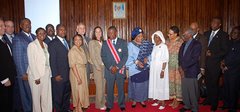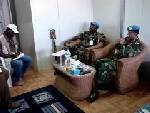
(Reuters) - Guinea's President Lansana Conte called on the population and the army to remain united behind him on Sunday after days of violent protests against his rule during a crippling general strike in the West African country. Union leaders launched the 12-day-old stoppage because they say Conte, a reclusive diabetic in his 70s, is unfit to govern. Clashes between protesters and the security forces have killed at least eight people across the world's top bauxite exporter. "Those who want power must wait their turn. It is God who gives power and when he gives it to someone, everyone must stand behind him," the veteran president said on state radio. "Guineans must remain united, above all us soldiers, because we must be proud of wearing the uniform, a sign of allegiance to defending the country," he added. Conte seized power in Guinea in a 1984 coup and the strike poses the toughest challenge yet to his 23-year rule, threatening to throw the former French colony into turmoil. Religious leaders, the unions, civil society activists and the government were in talks to try to resolve the crisis, Guinea's Anglican bishop Albert Gomez told Reuters. U.N. Secretary-General Ban Ki-moon urged all sides to show restraint. "He encourages them to avoid any action that would result in casualties and to reach a peaceful and mutually satisfactory agreement that would help restore calm and refocus the efforts of the country on poverty alleviation and development," a U.N. statement said. Conte's rule has long been based on the support of the military, but diplomats question how long the army -- itself riven by generational and ethnic divisions -- will remain loyal in the face of popular revolt. "There are lots of young officers in their 30s who are not just frustrated about Conte but about senior people in the army," said one diplomat in Conakry. BAUXITE TRAINS STONED Protesters in Labe, northeast of Conakry, slit the throat of an effigy symbolising Conte before marching it in a coffin through the streets at the weekend, residents said. State radio said youths had stoned mineral trains carrying bauxite to Conakry port. Industry officials have already said the strike has halted output at the country's main bauxite mine and mineral trains to Kamsar, northwest of Conakry. Police had arrested 95 people since the start of the strike, 10 of whom had been formally charged, state radio said. The ruling party called the protests an attempt to seize power. "These are not union demands but political demands. It is an attempted civilian coup d'etat," said Sekou Konate, secretary-general of Conte's Party of Unity and Progress (PUP). The violence spread on Friday to Guinea's south, a region seen as particularly vulnerable because of its porous borders with Liberia, Sierra Leone and Ivory Coast. West African heads of state voted at a meeting of the regional body ECOWAS late on Friday to send a high-level commission to Guinea to urge negotiations between the unions and the government. Senegalese President Abdoulaye Wade and Nigeria's Olusegun Obasanjo both volunteered to head the delegation. Guinea's opposition said the planned mediation was too little, too late. "The Guinean people have already taken their destiny in hand. Now is not the moment to stop the process of change," said Jean Marie Dore, head of the opposition Union for the Progress of Guinea (UPG) party.



No comments:
Post a Comment